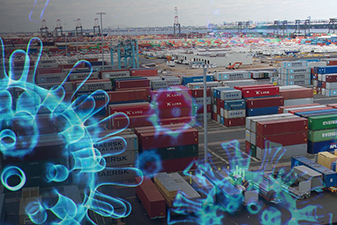|
By Cecile Entleitner, Associate, Blakey & Agnew
The ever-growing effects of the COVID-19 pandemic have resulted in unprecedented challenges impacting the general public as well as nearly every major industry. The freight transportation sector in particular has faced significant supply chain disruptions, leading to regulatory and operational uncertainties across all modes. From workforce safety concerns, to hours of service compliance, truck size and weight restrictions, container availability, warehouse storage, and reduced air cargo capacity, the pandemic has affected every facet of goods movement transportation. As the industry continues working to keep the supply chain moving, Congress and the Administration are considering measures to mitigate the immediate and long-term implications.
Modal administrations of the U.S. Department of Transportation have issued several emergency declarations and waivers, providing temporary relief from certain regulatory requirements. The Federal Motor Carrier Safety Administration waived hours of service regulations for commercial trucks transporting emergency supplies, CDL license renewal requirements for certain drivers, as well as CDL applicant and permit holder restrictions. To increase access to food services for truck drivers, the Federal Highway Administration has permitted food trucks to operate within truck rest areas on Interstate Highways. The Federal Railroad Administration waived several safety inspection and testing requirements for Class I and short line railroads to account for workforce shortages. Additionally, the Federal Maritime Commission authorized a new Fact Finding initiative, engaging stakeholders to identify ocean supply chain disruptions and develop potential mitigation strategies.
Congress has responded to COVID-19 by passing three economic stimulus packages. The third and largest package, signed into law on March 27, provided over $2 trillion in total funding. The Coronavirus Aid, Relief, and Economic Security (CARES) Act appropriated approximately $114 billion for the transportation sector, most of which was directed toward formula funding and grants for airports and mass transit. The bill also provided $349 billion for small business loans to cover expenses such as payroll, mortgage, rent, and utility payments. The CARES Act also extended eligibility for unemployment benefits to certain groups who normally would not qualify, including gig workers and independent contractors. The legislation granted states the ability to temporarily suspend truck weight and size restrictions on Interstate Highways. Additionally, the CARES Act made it easier for Congress to appropriate funding from the Harbor Maintenance Trust Fund (HMTF) for harbor maintenance and dredging needs by removing budget restrictions on HMTF spending to allow the appropriation of the full amount collected in a prior fiscal year.
|

While the third phase of COVID-response legislation addressed immediate mitigation funding for the public and certain impacted industries, several stakeholders, lawmakers, and even the President have called for an additional stimulus package focused on infrastructure investment. On March 30, President Trump issued a tweet expressing his support for a $2 trillion infrastructure bill as part of a phase four package. House Democratic leadership (including Speaker Pelosi and House Transportation and Infrastructure Committee Chairman DeFazio) subsequently announced their intent to incorporate their five-year, $760 billion infrastructure proposal which was published earlier this year into the next stimulus bill. The proposal included increased funding for surface transportation improvements, broadband, clean drinking water, and community health centers, with an overall focus on long-term resiliency and climate provisions. House Democrats planned to finalize this infrastructure package when Congress returns in late April or early May.
Congressional Republicans have been skeptical toward both the timing and content of a subsequent relief package. While Senate Majority Leader McConnell indicated a need for a fourth stimulus bill, he keyed in on additional funding for payroll protection programs.
Both House Minority Leader McCarthy and McConnell dismissed the notion of a significant infrastructure investment within a forthcoming stimulus bill. Deviating from her previous comments, Speaker Pelosi said on April 3 that an infrastructure package may have to wait until after the passage of phase four legislation. Emphasizing the importance of bipartisan support, she stated the fourth stimulus could instead build upon the immediate relief measures included in the CARES Act.
As the appetite for an infrastructure stimulus bill appears to be changing by the minute, transportation policy discussions will likely be ongoing among stakeholders and lawmakers alike. With the FAST Act expiring in September and the impacts of COVID-19 becoming increasingly apparent within transportation supply chains, the coming months will certainly present significant opportunities and challenges for upcoming infrastructure legislation.
Blakey & Agnew, LLC is a public affairs and
communications consulting firm based in
Washington, DC.
|


